Directed by David Drake, Provincetown Theater’s production of The Glass Menagerie — Tennessee Williams’s memory play about love, loss, and familial dysfunction — opens at the Playhouse in the Parking Lot, 238 Bradford St. in Provincetown, on Monday, Aug. 2 and runs through Sept. 2. Performances are Monday through Thursday, 7 p.m. Tickets are $45 at provincetowntheater.org.
Provincetown Theater
THEATER REVIEW
Finding Love Amid the Culture Wars
The Provincetown Theater puts pink icing on The Cake
Della, the North Carolina baker at the center of Bekah Brunstetter’s play The Cake, is a deeply conflicted woman. She’s not a cultural punching bag — a Paula Deen or Tammy Faye, clownishly unhip and down-home devout — but a sensitive soul who believes in following the rules. Specifically, she insists on following baking recipes without deviation, and, when it comes to sex roles and rituals, adhering to church doctrine.
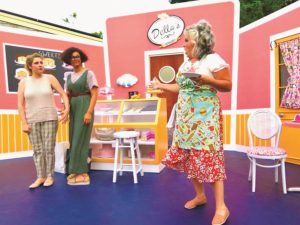
Della is preparing to compete in a TV bake-off when she is visited by Jen, the daughter of her late best friend, who asks her to bake her wedding cake. The only problem: Jen is marrying a woman, Macy, and the two are living ultra-progressive lives in Brooklyn, N.Y. Della tells Jen she’s too busy and can’t bake the cake, but they both know the real reason why: Della can’t integrate a same-sex relationship into her worldview. When Jen asks Della what her late mom would have thought of her marrying Macy, Della says, with sympathy, “It would break her heart.”
The play, which opened off-Broadway in 2019 and is at the Provincetown Theater’s outdoor Playhouse in the Parking Lot through July 22, has been noted for its topicality, coming a year after the Supreme Court decided that a Colorado baker’s religious beliefs allowed him to violate civil rights law and refuse to bake a wedding cake for a gay male couple.
But Brunstetter, a successful TV writer from North Carolina, focuses on the personal relationships involved, not on the law or religion. The author’s political bent is not in doubt: though Jen is torn by her emotional connection to her Southern upbringing and its moral judgments, she understands the liberating effect of coming out and recognizes that it’s her personal truth. The Cake is not an “issue” play, per se: it’s a social comedy, empathetic to everyone’s foibles — from Macy’s lefty dogma to Della’s ailing sex life with her good ol’ boy husband, Tim — and that’s how David Drake, the Provincetown Theater’s artistic director and the director of this show, treats it.
Local scenic design master Ellen Rousseau has created a joyful candy-colored cartoon of a set, with Della’s bake shop in the middle and the roll-out bedrooms of the two couples on either side — Macy and Jen on the left, Della and Tim on the right. Though susceptible to cancellations because of weather, the Playhouse in the Parking Lot is covered in a cushion of artificial grass and rows of comfy benches: it’s a lovely summer setting for a comedy confection such as The Cake.
The most winning attraction of this production, however, is the performance of Jennifer Cabral as Della, and her repartee with real-life husband Ian Leahy, who plays Tim. The play’s dramatic conflict rests on Della’s shoulders, and Cabral gets the emotions right. The couple is childless, and Tim’s realization that he’s infertile has killed his libido, or so he says. Their attempts to rekindle desire, enhanced by food, are the play’s funniest bits, and Cabral and Leahy are marvelous together.
Della is a frustrated contender in a man’s world: she has fantasy encounters with the bake-off host (the voice of Fred Jodry) and her pride and personal investment in her cakes and her shop are clear. The comedy of the situation is somewhat murkier in these scenes, but Cabral gives Della an earthy dimension that holds them together and keeps it real.
As the lesbian couple, Jackie Marino-Thomas as Macy and Vanessa Rose as Jen are persuasive and appealing, but, despite some bickering over Macy’s inflexibility and Jen’s sense of shame, there’s not much doubt about their love and the wedding itself. That’s why the real character arc belongs to Della.
Brunstetter knows how to construct a traditional comedy, and the heartbreak never lasts too long. The Cake comes out of the oven as lighter pastry than Della’s recipes might lead one to expect. But after a year and a half of Covid, Drake has a pretty good sense of where he can take his audience. The company’s next production is Tennessee Williams’s The Glass Menagerie, which is heavier material, indeed. By then, we’ll be ready. For now, The Cake is a tasty way to welcome live theater back into our routines — including a delicious surprise at the end!
Flour Power
The event: The Cake, by Bekah Brunstetter
The time: Monday through Thursday, 7 p.m.
The place: The Provincetown Theater’s outdoor Playhouse in the Parking Lot, 238 Bradford St. (enter at rear)
The cost: $40/$50 (premium seats) at provincetowntheater.org
Provincetown Theater Takes to the ‘Parking Lot’
After a 16-month pandemic-induced hiatus, the Provincetown Theater is back this summer, presenting “Playhouse in the Parking Lot,” a three-show outdoor season in the back yard of 238 Bradford St.
Kicking it off, June 17th through 19th, is the regional premiere of Neptune, a one-man play by Timothy DuWhite about being Black and gay in America. Then, from June 28th through July 23rd, is the Cape Cod premiere of The Cake, a new romantic comedy by Bekah Brunstetter, creator of This Is Us. Finally, from August 2nd through September 2nd, the theater puts on an old favorite, Tennessee Williams’s The Glass Menagerie. A season subscription is $99 at provincetowntheater.org.
THE SHOW MUST GO ON
As Covid Subsides, Theaters Push to Reopen
Outdoor stages, new approaches planned
Few things in the life of the Outer Cape have been hit harder by Covid than theater. Live outdoor cabaret performances resumed after the lockdown, and the Provincetown Tennessee Williams Theater Festival managed to put on a play in the Grace Hall parking lot to a drive-in audience. These signs of theatrical life were an inspiration to David Drake, artistic director of the Provincetown Theater, who desperately wanted to bring his company back onstage. Virtual events helped maintain a connection with his audience, but live theater has no substitute.
By September 2020, he realized it was likely that playing indoors in summer 2021 would not happen. “We lost 90 percent of our income from ticket sales last year,” Drake told the Independent. “We can’t afford to do that again. We just didn’t know which direction the country and Covid were going. But by the beginning of March, with Biden in office and vaccinations happening, I came up with a plan.”
That plan was to create an outdoor stage in the theater’s parking lot, behind the building at 238 Bradford St. Drake had been meeting with Christopher Ostrom, producing artistic director of the Wellfleet Harbor Actors Theater, and Janine Perry, artistic director of Cape Rep in Brewster. “How do we go outdoors?” Drake asked. “We’re different ships, but we’re all in the same storm.”
The other theaters had an edge: WHAT already had permits for outdoor productions on its property. And Cape Rep already had an outdoor stage.
“I started reaching out to our abutters,” Drake said. There was also the problem of which plays to put on. The postponed slate from 2020 was unworkable. “Because we’re a non-union theater, we’re not allowed to issue guest contracts to performers. Two of the shows had Equity actors in them,” Drake said, referring to Actors’ Equity Association, the performers’ union.
His board wanted him to limit casts to four actors or fewer to hold down costs. One postponed show, Jerker, a play about gay phone sex, would fit that limit, but it would have to take place in daylight, because of nighttime noise considerations. “It needs darkness,” Drake said. “In daylight, it’s camp. Sex in daylight is unromantic, unsexy. You’re looking at the wrong things.”
Choices were limited. “I didn’t want to do Love Letters or The Gin Game,” he said. “No one would come unless I got Ryan Phillippe and Reese Witherspoon. I wanted to do The Skin of Our Teeth. I thought it would speak to our time — it’s funny and weird. There’s a giant pet dinosaur that could live in the parking lot. We could use a car to drive the actors out. But it had a cast of six.”
He budgeted without concessions. The theater lacked an outdoor liquor license and would need to build a kitchen to serve the required food. “If you do the math, it won’t work,” Drake said.
Despite opposition from some abutters, the licensing board granted permission on April 13 to set up an outdoor stage. Drake is basing his revenue estimates on 44 seats, but he’s hoping that the town will allow him more, based on the size of the parking lot. The theater is turning its indoor space into larger, safer dressing rooms.
Most Cape theaters have not announced their summer schedules yet, but Drake offered a tantalizing tidbit: for one weekend in late June, he’ll present Neptune, by Timothy DuWight, an autobiographical piece about being Black and gay. The two remaining productions will be announced next week.
Ostrom, at WHAT, is putting on four summer shows: two on the main stage in front of the entrance, for four weeks each; one limited-run event in the middle of the summer; and one show for kids in the tent out by the highway.
“We plan on announcing by May 1,” Ostrom told the Independent. As an Equity house, WHAT follows union safety requirements. “We are a fully ‘bubbled’ company,” he said. “Because performers will be rehearsing and performing without masks, anyone who is onstage or interacts with those people is bubbled — tested weekly and quarantined if someone shows up positive. Those who don’t interact are working remotely. Six-foot social distancing applies to everyone. That’s been kind of a fun challenge to take on.”
The actor-run Harbor Stage Company at Wellfleet Harbor was forced to wait out 2020. “We know that we will be back in the building for summer 2021,” emailed artistic director Robert Kropf. “We’re presently working through exactly what configuration we’ll use — if at all. Union concerns and safety protocols, ever shifting, require great resourcefulness. We’re hopeful that by August, we’ll be onstage again. The charm of the harbor, its rough-and-tumble-ness, is not easy to re-create elsewhere. Anything outdoors could remove us from the location proper, which we’re looking at as we wrangle out exactly what this summer will look like. The main challenge is remaining true to what we do and the way we do it.”
Provincetown Theater Zooms to Victory
Partnering with the Capital Classics Theatre Company of West Hartford, Connecticut, the Provincetown Theater is presenting a free Zoom event on Saturday, March 13th at 7 p.m. with performers of Athol Fugard’s one-act play Victory, set in South Africa in 1994, after the apartheid system has been defeated and Nelson Mandela elected president. The story involves two teenagers who were found robbing a home, leading to talk about poverty and despair.
The three-person Capital Classics cast — Eric Nesmith, Geoffrey Sheehan, and Tonille Simone Watkis — will perform scene readings, directed by Jan Mason. Between readings, the artists will discuss the play’s themes and relevance with the audience.
The event is part of the Capital Classics series “Contemporary Classics Conversations.” To get a Zoom link and participate, go to provincetowntheater.org at 7 p.m. on Saturday.
MUSICIANS
The Secret of Ken Field’s Sax Appeal
His jazz improvisations will be featured in ‘Music Without Borders’
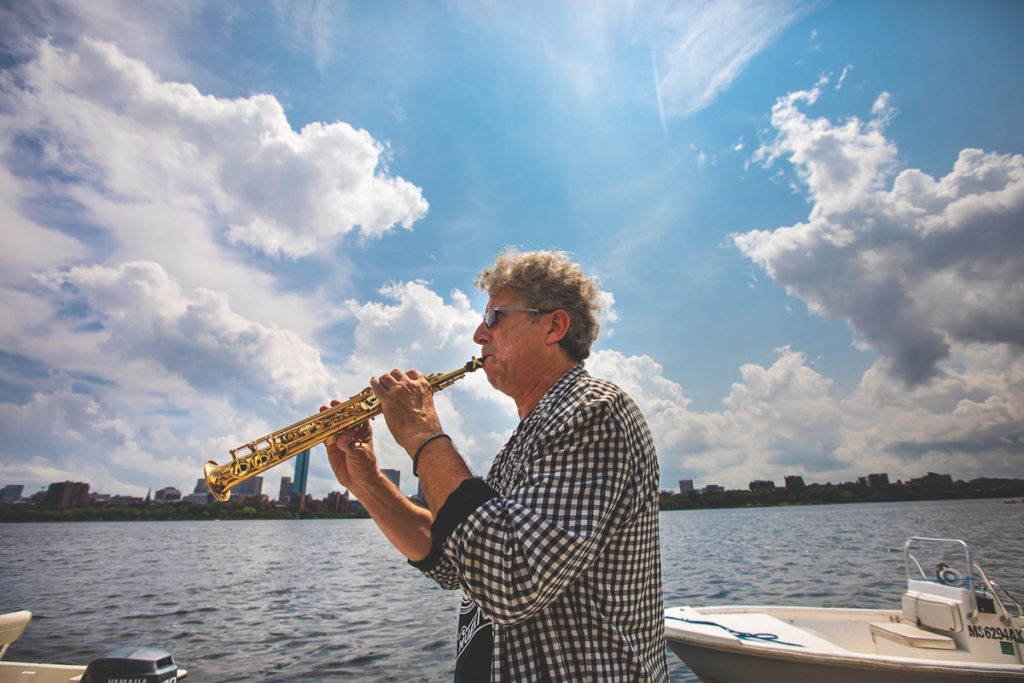
It starts with long drawn-out notes forming a simple melody. The sound of the alto saxophone is warm and reedy. At first, you might wonder, where is this going? But then, with the help of a loop pedal, the saxophone harmonizes with itself, and a piano joins in with low rumbling notes.
This improvisation between saxophonist Ken Field and pianist John Thomas is part of the first episode of “Music Without Borders,” a virtual series presented by the Provincetown Theater in which Thomas plays world music and original compositions with special guests each week. Field returns for episode six on Sunday, Feb. 28.
For the last 20 years or so, Field has been spending part of his winters and all of his summers in Truro, and the rest of the year in Cambridge. “My original connection was actually doing an amazing gig at a now defunct room on Shank Painter in Provincetown with a ’70s band called Crown Electric Company,” he says. Now, he plays locally with Chandler Travis, Zoë Lewis, and Mark van Bork.
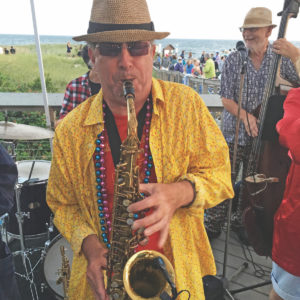
Growing up in New Jersey, Field started on clarinet when he was 10 years old. Though he played mostly band music, he listened omnivorously to all types of jazz and pop on the radio. “One thing I credit that period with is giving me a really solid sense of time, of rhythm,” he says.
As an undergraduate studying computer science, he knocked out his front tooth in a freak accident and switched to flute, then picked up the alto sax — both were easier on his new smile. He eventually decided to pursue music full-time instead of working with computers, and studied with Joe Viola at Berklee School of Music.
Field first tried improvising as an undergraduate. He was working at a coffee shop where a blues band performed and would play along softly on his flute. “I was kind of jamming with them behind the counter, but no one could hear me,” he says.
He started layering his performances at Berklee. He’d be recording solos for other people’s songs, and, after a couple of takes, ask to hear the takes played together, simultaneously. “It always reminded me of looking at yourself in a dressing room mirror, where you see multiple images of yourself,” he says.
He found the process useful when he did the music for the animated shorts his late wife, artist Karen Aqua, created for Sesame Street. “We didn’t have much of a budget, so I would layer myself, on saxophone, in the studio,” Field says.
His first solo album, Subterranea, was recorded in New Mexico — where Aqua was doing a residency — in an underground space with “amazing acoustics,” using a rented multi-track tape recorder.
He wrote layered saxophone music for Bridgman/Packer Dance in New York, performing one track live; the dancers performed with video projections of themselves. While touring in Budapest, the company needed music during a set change. “There wasn’t a budget to bring any other musicians, and I was very nervous about doing solo saxophone,” Field says. That’s when he started using a loop pedal.
“I’m using the looper in a slightly different way than a lot of people,” he says. Instead of recording a groove, adding a bass line, and overlaying a melody, Field’s method is “totally rubato,” he says, with more of an ambient sound. He recently recorded a whole album with loop pedal, Transmitter, coming out April 2.
What goes into that first track? “I would like to say that I’m not thinking at all, and it’s just streaming out of my emotional state,” Field says, but there are considerations. The melodic phrase repeats, so it must be interesting, sparse, and tonally simple — no complicated chord changes.
“There are pluses and minuses” to performing with yourself, says Field. It may be safe in a pandemic, but feeding off another person is intrinsic to improvisation. “Doing it alone, I can do exactly what I want,” he says, but, he admits, “I get in ruts.”
Covid has been tough on musicians and audiences, yet Field remains optimistic. He performed outdoors last summer and has been recording tracks from his home in Truro. He’s been memorizing Bach’s first cello suite transcribed for saxophone. “I think the cello and alto sax have a lot in common,” says Field.
And, for the last 10 years, he’s hosted the radio show The New Edge on WNBR and WOMR, dedicated to creative instrumental music, including contemporary classical and electronica.
“Music Without Borders” has been a creative boon. “I have so much respect not only for John’s musicianship and his varied musical interests but also how much he gives back to the community,” Field says. Their upcoming streamed performance will be an arrangement of the hymn “Abide With Me.”
“I’ve always been attracted to music that’s a little different,” says Field. “If you try something new, you don’t know if it’s going to work. That’s the definition of experimental. It’s an experiment.”
In the Loop
The event: Ken Field joins John Thomas for an episode of the Provincetown Theater’s virtual series “Music Without Borders”
The time: Sunday, Feb. 28, at 7 p.m.
The place: Streaming at provincetowntheater.org
The cost: Free; $15 suggested donation
Mellow Cello
“Music Without Borders,” a weekly music meditation show with pianist John Thomas that’s presented online by the Provincetown Theater, continues on Sunday, February 21st, 7 p.m., with classical cellist Chanthoeun Varon Collins. Watch at provincetowntheater.org; $15 suggested donation.
THEATER
For Sallie Tighe, the Outer Cape Is Both Stage and Salvation
She and a corps of local talent will once again put on ‘The 24 Hour Plays’
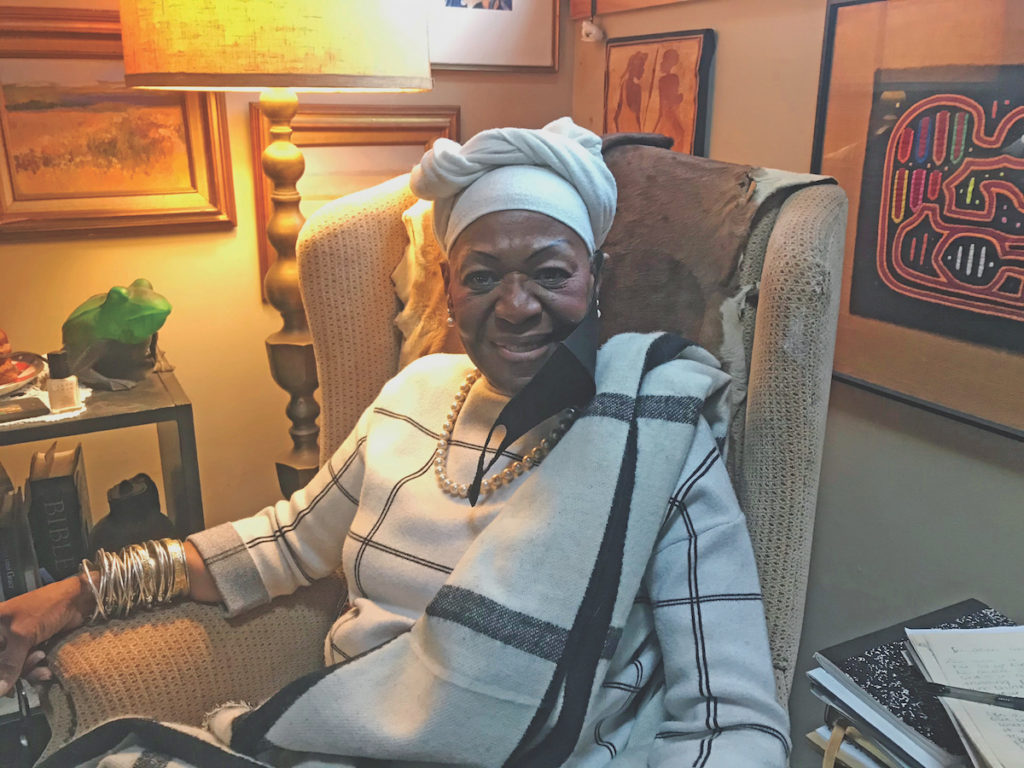
The thing that reassures Sallie Tighe the most about “The 24 Hour Plays” — the annual Presidents Day tradition at the Provincetown Theater — is that she doesn’t have to memorize her lines. That’s because the actors have their scripts in hand.
It works this way: each one of a group of playwrights writes a 10-minute play on Friday night (into the wee hours) for actors chosen at random (names in a bag), who rehearse with directors on Saturday, during the day, and perform Saturday night — a 24-hour process. Tighe has participated every year for most of the 11 years it’s been done.
Memorizing is intimidating for Tighe, who turns 75 this year. “I can’t even memorize my favorite Elvis tune,” she says. One year, she forgot to bring her script onstage. Her mind went blank, and she thought she’d have to ad-lib the whole thing. Then, someone handed her a script.
Acting is a relatively new passion for Tighe. She’s lived here for nearly 50 years but has been acting only for the last 13.
“Someone heard me speak and approached me,” she says. “They said, ‘Are you an actor?’ I was cast in Doubt, at the Provincetown Theater.” It opened in January 2008. Tighe played the mother of a young boy who may or may not have been abused by a Catholic priest. It’s the role that nabbed Viola Davis an Oscar in the movie adaptation.
Tighe had never taken on a stage role before and was to perform in Doubt opposite Equity actors. But there’s a warmth, excitement, and theatricality to her manner that makes her casting seem like an awfully good hunch.
“That was my first, and you think I got bitten? Oh, yeah,” Tighe says with a smile.
In the years since, she’s been quite active. In Neil Simon’s The Odd Couple: Female Version, she played Florence (Felix Unger as a woman). She played a serial killer in Arsenic and Old Lace. In David Drake’s production of The Divine Sister, a drag romp by Charles Busch starring Ryan Landry, she played Mrs. Levinson. “I play a lot of Jewish women,” Tighe says.
Well, not exactly. In Susan Grilli’s production of A Raisin in the Sun, Tighe played a Black matron. In Jean Genet’s The Maids, she played the wealthy Madame, with Jody O’Neil and Joe MacDougall as her titular servants. And in Drake’s largely drag production of The Importance of Being Earnest, Tighe was the Rev. Chasuble.
She grew up in the Bronx, N.Y., spending seven years in a foster home. After graduating from Evander Childs High School in 1964, she got a job as an administrative clerk in Brooklyn and had two daughters. “My husband was a batterer,” she says. “Then I met this prince, this guy who said, ‘I’m going to take you away.’ He brought me here with my two daughters.”
Tighe arrived in Provincetown in 1973, awestruck by the beauty of the place. “We were blown away,” Tighe says. “ ‘This is where we’re going to live?’ my girls said. I was fortunate to get a job in the school system — administrative assistant to the director of special education. It was a fabulous place to bring up children. It was a lively time, and I was just sucking it up. I met a lot of wonderful people being in this town. Some have died, but most are still in my life.”
Tighe’s brother, who was an intravenous drug user, got AIDS at the height of the epidemic and came to Provincetown to die. “He was at Foley House,” she says. “I’m so grateful for that.”
Her relationship with the “prince” who brought her here ended, and she eventually married Peter Tighe, with whom she shares a cozy home in Truro. “He’s a masseur, a musician, and a marvelous carpenter,” Sallie says. “He’s the one. His livelihood is making people feel better.”
She went back to school to get a degree, at Lesley College. “I thought, who is Sallie Tighe, a Black woman coming of age in this sea of whiteness?” she says. “And I started to write.”
Her poetry has become important to her, just like her acting gigs. And that brings her back to “The 24 Hour Plays.”
This year the plays will be performed via Zoom. The playwrights include Ira Brodsky, Racine Oxtoby, Candace Perry, Laura Shabott, and Bragan Thomas. The directors will be Nathan Butera, David Drake, and Frank Vasello. And the performers, along with Tighe, will be John Dennis Anderson, Mark Enright, Marci Feller, Sylia Francis, Paul E. Halley, Dian Hamilton, Alison Hyder, Tamora Israel, Mary Chris Kenney, Sandra Paredes, Sylvia Peck, Julia Salinger, Tia Scalcione, and David Wallace.
“It’s been such phenomenal work,” Tighe says. “And, of course, us actors go out there and bring it to life.”
Long Day’s Journey Into Theater
The event: “The 24 Hour Plays”: a program of 10-minute plays written, rehearsed, and performed on Zoom within 24 hours
The time: Saturday, Feb. 13, 7 p.m.; encore, Sunday, Feb. 14, 2 p.m.
The place: Go to provincetowntheater.org for link
The cost: Free; suggested donation, $20
Bulgar Suite
“Music Without Borders,” a weekly music meditation show with pianist John Thomas, presented online by the Provincetown Theater, continues Sunday, February 14th, at 7 p.m. This week features Bulgarian folk singer Elena Mancheva and wind player Justin Torrellas. Watch at provincetowntheater.org; $15 suggested donation.
Stay Tuned
“Music Without Borders,” a weekly music meditation show with pianist John Thomas, presented by Provincetown Theater, continues Sunday, February 7th, at 7 p.m. with singer Mozelle Andrulot. Watch at provincetowntheater.org; $15 suggested donation.
Global Warming
“Music Without Borders,” a weekly music meditation show with pianist John Thomas, presented by Provincetown Theater, continues Sunday, January 31st, 7 p.m. with Bulgarian folk singer Elena Mancheva and wind player Justin Torrellas. Watch at provincetowntheater.org; $15 suggested donation.
Coffeehouse at the Mews Goes Virtual
Coffeehouse at the Mews is celebrating its 30th anniversary. But this year, it is going virtual. Watch Mondays at 7 p.m. via Facebook or YouTube.
Presented by Live From Provincetown, the virtual coffeehouse will be hosted by Ron Robin and Peter Donnelly. It will feature guest musicians and poets to be announced each week. Donations will support Coffeehouse at the Mews, WOMR, and Provincetown Theater.
Strut Your Stuff
Provincetown Theater is accepting pitches through Friday, November 20th, to perform at its home-grown talent “Townie Holiday Extravaganza!” Think you have what it takes? Email [email protected]. The show will live-stream on December 20th at 7 p.m.
COVID UPDATE
Despite New Guidelines, Indoor Venues to Remain Mostly Shut
Phase three, step two changes leave some scratching their heads
Theater and music lovers were overjoyed last week when Gov. Charlie Baker announced that lower-risk communities may move to “step two” of phase three reopening guidelines, as of Monday, Oct. 5. Step two allows for indoor performances, and outdoor performances are given increased capacity.
Interviews with managers of performing arts venues and organizations on the Outer Cape, however, suggest that little is likely to change in the near future.
In lower-risk communities, which currently include Cape Cod, indoor performance venues may now open with 50-percent capacity and a maximum of 250 people. Outdoor performance venues may increase to 50-percent capacity, also with a maximum of 250 people; previously, the limit outdoors was 25 percent, with a maximum of 50 people.
Fifty-percent capacity is based on an occupancy permit, or, if one doesn’t exist, 10 people per 1,000 square feet of space.
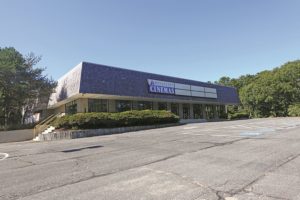
Indoor gatherings (not performances) remain capped at 25 people, while private outdoor gatherings remain capped at 50 people. Outdoor gatherings “at event venues and in public settings” may have up to 100 people. Back in August, Gov. Baker had decreased that number from 100 to 50.
The difference between a “public outdoor gathering” and a show at an outdoor performance venue — which have wildly different limits — appears simply to be whether the event is held “for the primary purpose of watching a performance,” according to Reopening Massachusetts. It’s not clear why there should be a difference.
Indoor movie theaters were allowed to open in step one of phase three. The permitted capacity, 50 percent with a maximum of 250 people, has not changed.
To make matters even more complicated, in Provincetown, where most Outer Cape venues are located, indoor performances are still prohibited by a joint emergency order of the board of health and select board that has been in effect since the beginning of June.
David Abramson, the select board chair, and Steve Katsurinis, the board of health chair, said in a joint public statement, “Provincetown Schools are opening for in-person learning next week for the first time since March, and this significant development is the only change concerning the use of indoor space in town at this time.”
Rick Murray, general manager at the Crown & Anchor, said that the step two changes mean his outdoor poolside space will return to a capacity of 85 patrons. Regarding the town’s decision to prohibit indoor performances for the time being, he said he “supports it 100 percent.”
David Burbank, entertainment manager at Pilgrim House, doesn’t believe that the new guidelines expand the capacity of his inn’s outdoor space. He worries about how he will keep performers employed as the weather gets too cold for outdoor performances.
David Drake, artistic director of the Provincetown Theater, said that the step-two changes will have no effect on its 2020 season: “We’re doing virtual programming, but we’re not programming anything live.” He is in discussions on adaptable hybrid approaches for next year.
“We had some plans to do outdoor stuff this summer, and we decided to not do it, because we didn’t know if Covid was going to spike again,” Drake said. “We couldn’t afford to invest.”
Kevin Rice, artistic director of the Payomet Performing Arts Center in Truro, said that his venue will be unaffected by the new indoor guidelines, as the Payomet tent is not up, but he’s hoping to raise it in April.
“It’s clear that we are able to increase our capacity, and I’m sure we will,” Rice said, referring to Payomet’s outdoor Ballfield Drive-in. “But, honestly, the governor could increase it to 2,500, and that doesn’t mean we will sell more tickets. People are so impacted in their behavior. I think it is going to be years until we are back to normal.”
Christopher Ostrom, artistic director of the Wellfleet Harbor Actors Theater, said, “In the short term, we do not anticipate opening our doors: it’s too risky.”
Janet Lesniak, executive director of Wellfleet Preservation Hall, expressed confusion about Gov. Baker’s guidelines.
“In one place it says one thing, in another, it says something else,” she said. “Given the size of our back yard, we might be able to go up to 100, if it allows for appropriate social distancing and sight lines. That’s a math problem I haven’t figured out yet. However, I don’t anticipate anything inside at this point.”
None of the four Outer Cape libraries plans on doing indoor concerts or events in the near future. Jennifer Wertkin of the Wellfleet Public Library said that there are no plans to open its meeting room.
“I don’t see any live indoor programming at the library until there is a vaccine that has been distributed to the community,” said Debra DeJonker-Berry of the Eastham Public Library.
Though movie theaters were allowed to reopen at the beginning of phase three, many have chosen to remain shuttered until now.
Heidi Bolinger of the Provincetown Film Society said that the Waters Edge Cinema is hoping to reopen “on a limited basis,” available for “private use, special screenings, and programs.”
John Vincent, owner of the Wellfleet Cinemas, said his indoor movie theater will open in mid-November.
“The new guidelines enable us to open with concessions and a little more people in the auditorium,” he said. Vincent’s Wellfleet Drive-in is now closed for the season.
Howard Karren contributed reporting for this story.
THEATER
Tennessee Williams Fest Stays Live and Distant for 2020
The Municipal Abbatoir to be performed at parking lot drive-in
The view from the Grace Hall parking lot #3 of the dune and water tower above it would not be part of a Provincetown promotional flyer. But the sky was a saturated blue and the air was comfortably cool last Friday afternoon as David Kaplan, the longtime curator of the Provincetown Tennessee Williams Theater Festival, assembled his small cast and minimal crew on the parking lot and dune to rehearse The Municipal Abbatoir, a dystopian sci-fi one-act play by Williams. It will be performed there on Thursday, Sept. 24, through Sunday, Sept. 27, as part of the pared-down 2020 edition of the festival.
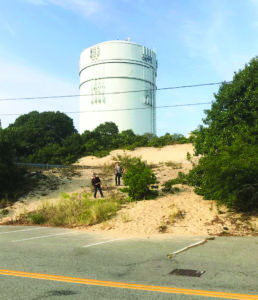
If the view was bleak, like an industrial park in the middle of nowhere, that was fitting for the play, in which a rebellious young man, determined to kill the General, the totalitarian leader of his state, persuades a dutiful clerk to do it instead. The clerk was on his way to the “abbatoir,” French for slaughterhouse, to sacrifice himself. In this brave new world, citizens offer up their lives to be processed as food.
Standing in the parking lot, where the festival’s drive-in audience will be watching in their cars and listening to miked actors on FM radio, Kaplan rattles off notes to his stage manager, Alston Brown. “Make sure the hat is black,” he says. “Our first day with the gun. We were hoping it would glint in the sun. It glints!” Kaplan loves finding Alfred Hitchcock moments in this production, particularly long shots from early British movies.
Up on the hill, David Drake, artistic director of the Provincetown Theater, and Ben Berry, artistic director of the Peregrine Theatre Ensemble, are performing a socially distant dance of death. Drake, looking downtrodden in dark clothes and a fedora, plays the clerk; Berry is the young man in a do-rag with assassination on his mind. As they say their lines and go through their paces, cars drive by on their way out of the parking lot, a man walks his two dogs, and a local teen walks straight through the middle of the dune on his way to somewhere else, oblivious to the rehearsal happening around him. Neither Drake nor Berry misses a beat, but they smile about it afterwards.
“That’s why we’re rehearsing,” Kaplan says. “To include that in it.”
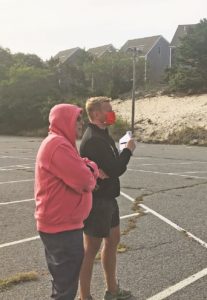
In the same way that Kaplan hopes to incorporate the flow of real life in his site-specific production, the Williams festival has adapted to the Covid pandemic. “Our aesthetic works within the confines of keeping the audience safe,” Kaplan says. The Municipal Abbatoir was originally planned for the Provincetown cemetery, and the theme for this festival is “Williams and censorship,” which Covid has largely silenced, as if playing the role of the oppressive state.
Instead of a cornucopia of international companies and a dozen plays, the Williams festival this year has just one, Municipal Abbatoir. Out-of-town companies are performing out of town, if they can; Penny Arcade will perform her rock cabaret act, “Longing Lasts Longer,” at the Bas Relief; and there will be presentations on Williams at the Bas Relief and Waterfront Park in the East End. The fest’s Tennessee Williams Institute will hold virtual seminars the following weekend, but Kaplan wanted the festival itself to be live events.
“This is what we do,” he says. “I’m not making movies or television. I’m not looking down on anyone who does virtual performances, but I don’t do them.”
The idea of a censorship-themed festival first came up when Kaplan was asked by Provincetown 400 officials what he’d like to do. “It really began five years ago, when I began wondering what theater was to the Pilgrims,” he says. “If there was any theater going on with the Pilgrims, it was in the woods, it was in secret, and they would have gotten spanked if they got caught. Theater was completely illegal in the Bay Colony, for all the usual reasons. It was where loose women saw men who shouldn’t be seen with them. There was the really bad example of men dressed in women’s clothing. And you could catch a disease by sitting in groups at the theater.” Again, that inevitable Covid connection.
But, like the Pilgrims, Covid was not able to completely silence the festival. “We were lucky that we could wait till late September,” Kaplan says. “We said in May that the drag queens and Rick Murray will figure it out for us. I didn’t want to be the first person to do live performance. I went to Varla’s first show and learned from it.”
Kaplan is looking to revive canceled productions next year, as the Williams festival moves forward. “It has taken nerves of steel and a real group effort,” Kaplan says. “I have a staff that believes in this. I have a board of directors that believes in this. We are creative people.”
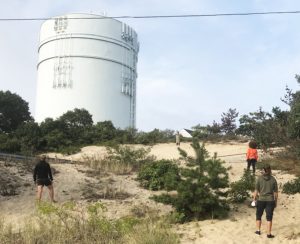
Provincetown Tennessee Williams Theater Festival 2020
The Municipal Abbatoir, by Tennessee Williams, with David Drake, Ben Berry, Ian Leahy, and Darlene Van Alstyne: Drive-in at Grace Hall parking lot #3: Thursday, Sept. 24, 2:30 p.m.; Friday, Sept. 25, 1 and 3 p.m.; Saturday, Sept. 26, 11 a.m. and 1 p.m.; Sunday, Sept. 27, 12:30 and 2:30 p.m.
“Longing Lasts Longer”: Penny Arcade performs her rock ’n’ roll avant-garde memoir cabaret: Bas Relief Park, 106 Bradford St.: Saturday, Sept. 26, 7 p.m.
“Cut Blanche”: a talk and screening about the censorship fight over A Streetcar Named Desire: Bas Relief Park, 106 Bradford St.: Thursday, Sept. 24, and Friday, Sept. 25, 7 p.m.; Sunday, Sept. 27, 6:30 p.m.
“Tennessee Talks: Revolution”: reading by Jeremy Lawrence of Williams’s calls to political activism: Waterfront Park, 387 Commercial St.: Sunday, Sept. 27, 10:30 a.m.
Tickets: $40 per person per event, in advance, at twptown.org.
